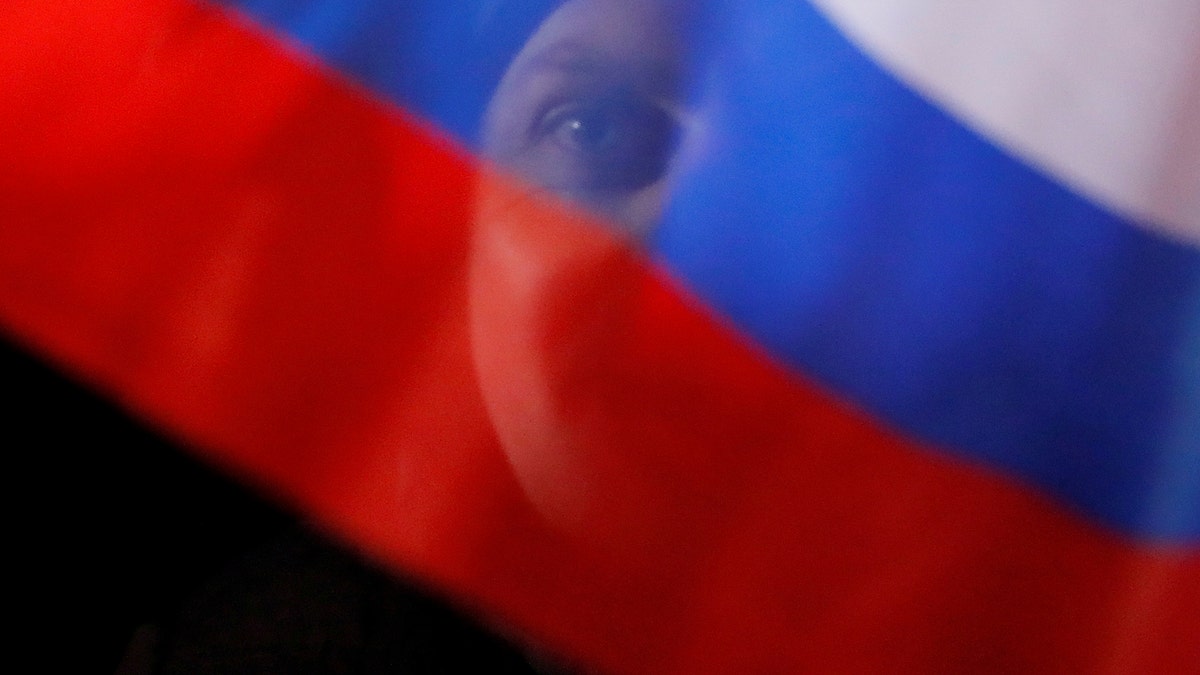
A man waves Russian flag during a rally and concert marking the fourth anniversary of Russia's annexation of the Crimea region, at Manezhnaya Square in central Moscow, Russia March 18, 2018. REUTERS/Maxim Shemetov
“Russia opened its arms, its heart and soul and welcomed you with joy and delight!” Russian President Vladimir Putin called out to exuberant crowds in Crimea Monday evening. He was at a concert in Sevastopol to mark five years since the annexation of Crimea.
“Five years passed like one moment. Now these emotions come back to me, the joy, the great victory,” said the Crimean President Andrei Babichev.
The taking of Crimea was an emotive moment for the nation and Putin’s popularity shot up 20 points, to the mid-80s, in the aftermath. But it recently lost those points. This was said to have been triggered by the raising of the pension age from 55 to 60 for women, from 60 to 65 for men. The relatively low Russian pension age was a sacred cow, a holdover from Soviet times. Some say the so-called “Crimean Consensus,” the ability of Crimea to put a smile on every Russian’s face, has dried up.
One could suggest that ratings don’t matter much in a Russia whose president has five years left on a term that should, in theory, be his last. But plenty of people would argue with that.
“I think it does matter,” said Eleonora Tafuro Ambrosetti, a researcher at the ISPI think tank in Milan. “A decrease in popularity means an increase in the willingness of the population to take to the streets and protest and this is not something the Kremlin is used to and the Kremlin fears.”
There have been a scattering of demonstrations since the pension age was lifted. Over the weekend, several hundred took to the streets of Moscow calling for social and political change. Hundreds is not huge. But they were vociferous.
“This year we got a horrific pension reform, it is terrible,” said opposition figure Sergei Udaltsov. “We got new taxes. We got new restrictions on simply criticizing the authority. Today a person will be held accountable for an insult against an official. We got dozens of cynical, insulting statements from the officials of various levels. They almost went nuts in recent months.”
Some worry Putin may look for another crisis to boost his standing. He has militarized the Crimean Peninsula in the five years that have passed.
At a recent panel discussion about Ukraine at Chatham House, Col. Vadim Skibitksi, the deputy head of intelligence for Ukraine’s Ministry of Defense, displayed charts that showed the exponential increase in Russian military hardware in Crimea. For example, before the annexation, there were 22 combat aircraft stationed there, according to Skibitski. Now there are 122.
“This is a threat for all countries in the Black Sea region,” he said.
Russian Sen. Viktor Bondarev recently said that the Kremlin is deploying nuclear-capable strategic bombers to Crimea.
James Appathurai, deputy assistant secretary general for Political Affairs at NATO, said that the annexation of Crimea is part of a pattern that began with Georgia and includes Russian intervention in Syria. But it was a game changer.
Appathurai said at that same Chatham House talk, “It is also important to recognize that Crimea gives Russia a stronger platform to project force and political influence far beyond Ukraine and even beyond the Black Sea. It is using this enhanced military capability to project force into the eastern Mediterranean, into the Middle East, and potentially elsewhere.”
NATO has spent the intervening years preparing to protect any further potential targets of Russian activity. And on the anniversary, the European Union countries reconfirmed they do not recognize the annexation. But the facts remain on the ground.
Despite the enormous cost of integrating the peninsula (one estimate is it will cost overall $82 billion) and the political costs of getting kicked out of the G8 and being slapped with sanctions, the overwhelming majority of Russians still support the annexation of Crimea, according to a recent poll. But increasingly, they are indicating that their main preoccupation is economic growth and stability.
